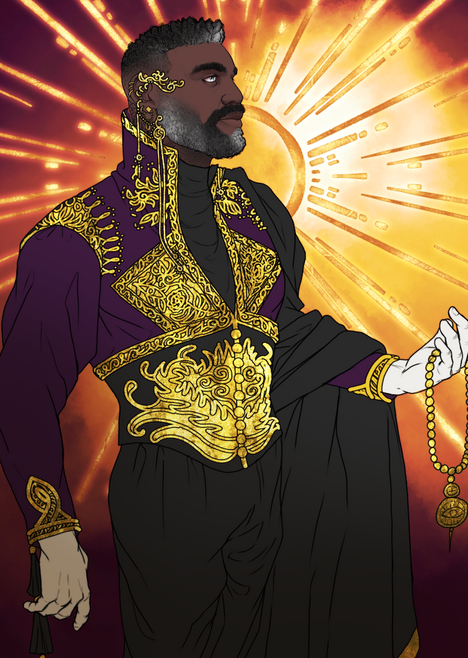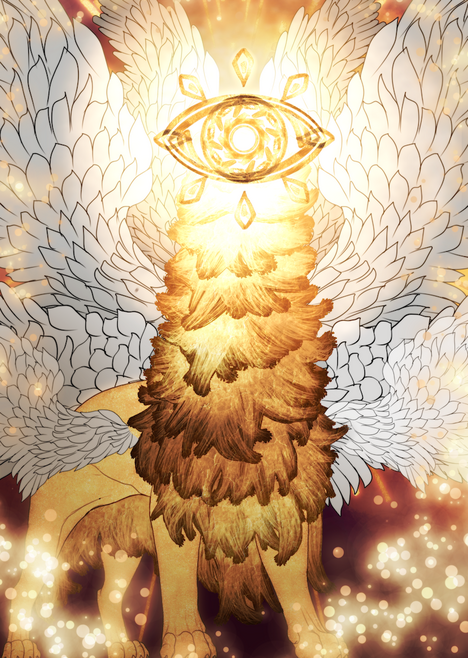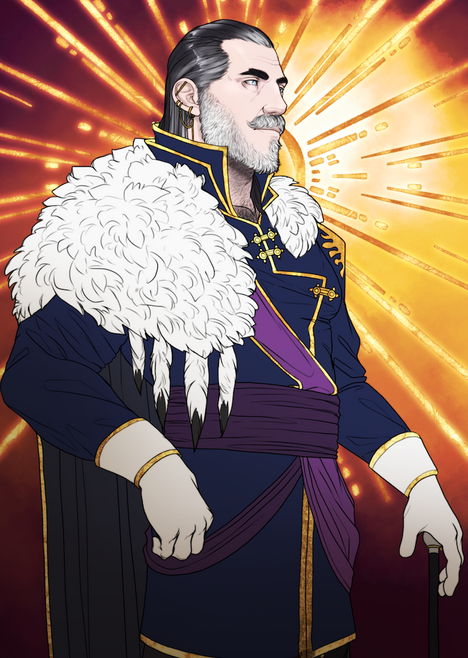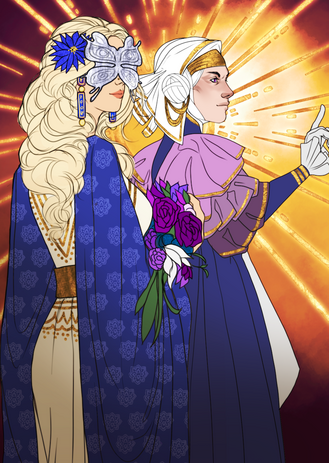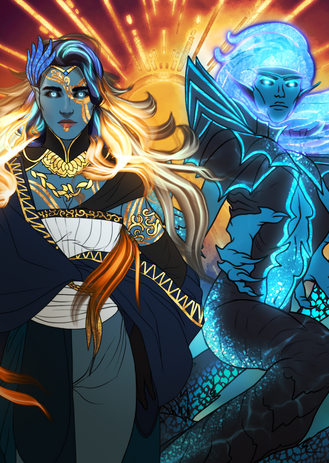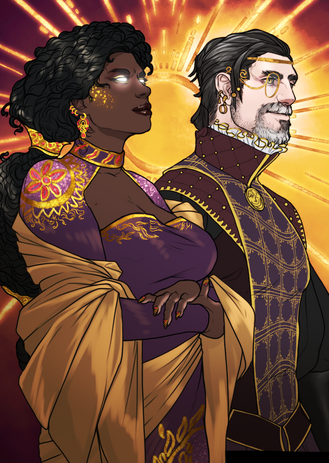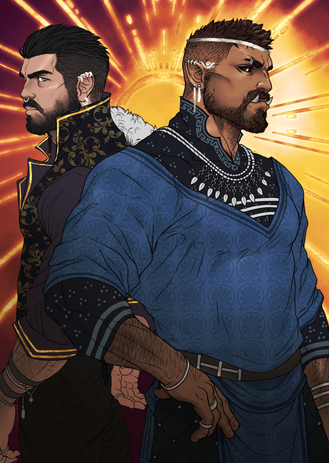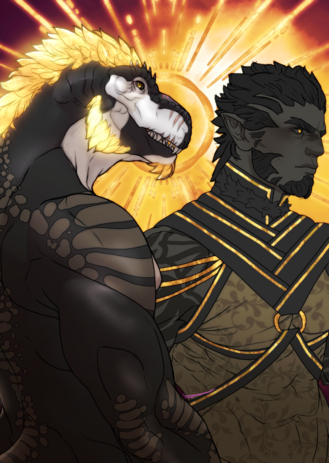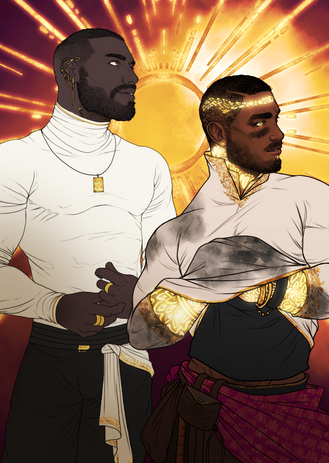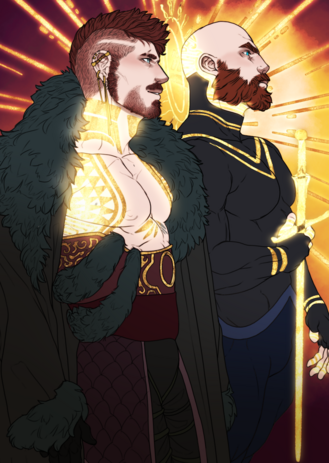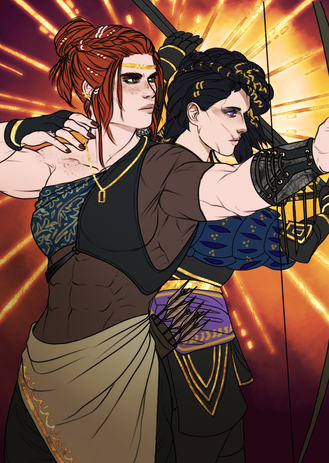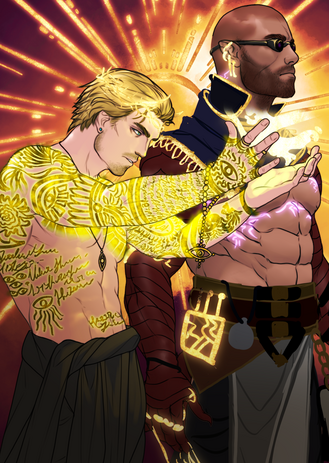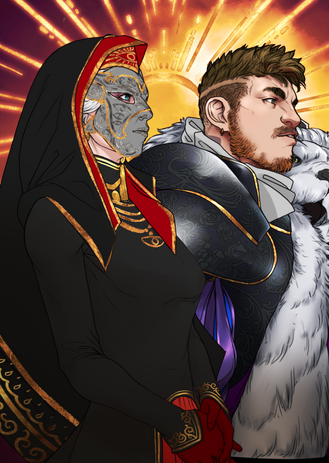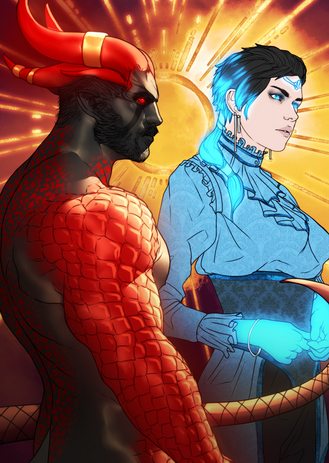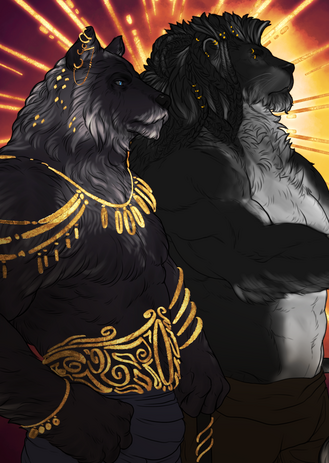More actions
No edit summary |
No edit summary |
||
| Line 74: | Line 74: | ||
* '''Mendes and Hor''' Mendes (left) is a Baskarr God, Hor is a mundanely raised Asha (both still living). Mendes was full of the sin of Defeatism, the loss of his people, the suffering, it all became too much for him to bear. He gave in to despair and loss, and gave up on everyone. Hor taught him the virtue of action, and the value of time, how limited the means of mortals are to act, and the duties gods have to be diligent. They now represent the virtues of diligence and activeness. | * '''Mendes and Hor''' Mendes (left) is a Baskarr God, Hor is a mundanely raised Asha (both still living). Mendes was full of the sin of Defeatism, the loss of his people, the suffering, it all became too much for him to bear. He gave in to despair and loss, and gave up on everyone. Hor taught him the virtue of action, and the value of time, how limited the means of mortals are to act, and the duties gods have to be diligent. They now represent the virtues of diligence and activeness. | ||
==Priestly Activities== | ==Priestly Activities== | ||
Unionist priests are part of the so-called Covenant College. At the very top is the Secilly Council. Originally this organization had a leader called the Supreme Reverend, however the Supreme Reverend position was abolished when the last Supreme Reverend discovered insidious corruption within the religious community, tried to expose it, and was assassinated for it. To compensate, Conclave determined that the Dogmatic community should henceforth be ruled by a Council of elder Arch-Everians. Below the Secilly Council, are the Arch-Everian, which are equivalents to Dukes in the Regalian Empire. They wield considerable power and rule over vast areas of land, subdivided into Everies. Below the Arch-Everian is the Everian, or just the average priest. Each Everian administrates an Everie, which is usually a piece of land donated to the clergy where they maintain temples, shrines, and sanctuaries, while also producing crops and tending to cattle. Everians perform all religious tasks such as confession, preaching, hearing concerns, and simply taking care of Unionist needs like a social caretaker or mental health worker. Arch-Everians on the other hand are more administrative in that they take care of the treasury, any military attached to the religious orders, and communication between the Secilly Council and the vast wide-spread Unionist elements. Formally the Emperor is the leader of the Holy Seat, which is more of a group term for the Palace and the Secilly Council grouped | Unionist priests are part of the so-called Covenant College. At the very top is the Secilly Council. Originally this organization had a leader called the Supreme Reverend, however the Supreme Reverend position was abolished when the last Supreme Reverend discovered insidious corruption within the religious community, tried to expose it, and was assassinated for it. To compensate, Conclave determined that the Dogmatic community should henceforth be ruled by a Council of elder Arch-Everians. Below the Secilly Council, are the Arch-Everian, which are equivalents to Dukes in the Regalian Empire. They wield considerable power and rule over vast areas of land, subdivided into Everies. Below the Arch-Everian is the Everian, or just the average priest. Each Everian administrates an Everie, which is usually a piece of land donated to the clergy where they maintain temples, shrines, and sanctuaries, while also producing crops and tending to cattle. Everians perform all religious tasks such as confession, preaching, hearing concerns, and simply taking care of Unionist needs like a social caretaker or mental health worker. Arch-Everians on the other hand are more administrative in that they take care of the treasury, any military attached to the religious orders, and communication between the Secilly Council and the vast wide-spread Unionist elements. Formally the Emperor is the leader of the Holy Seat, which is more of a group term for the Palace and the Secilly Council grouped, but historically Emperors have interfered very little in the day to day running of the Everies, and as such, this fact is usually ignored, the Emperor being considered a completely independent entity. This has also historically separated the Emperor from controversy among the Everians, and vice versa. | ||
==Expanded Lore== | ==Expanded Lore== | ||
The Expanded Lore section contains additional contextual information about the Unionist faith. This section is not necessary to read to get a good understanding of the lore, just the background information. | The Expanded Lore section contains additional contextual information about the Unionist faith. This section is not necessary to read to get a good understanding of the lore, just the background information. | ||
* | ===Contextual Lore=== | ||
This section contains a group of assorted ideas and pieces of information that are not at first glance relevant to the Religion or its texts, but that may become relevant when engaging in theological debate, or deeper storytelling about the Gods, as priests habitually do. This information is freely available to the people through reading archives and history books, though some of it may be a bit more contextual. If something would not be clear from history books, but learned by researching other religions and or belief systems, this will be mentioned. | |||
* Gods are either mundanely raised, incorporated, or post-death ordained. In the case of mundane raising, it is believed that the Everwatcher chooses a Unionist born child and gives them a divine spark, testing them in life for Godhood. If they pass, they become Gods and activate their Godly powers, and should they fail, they lose their Godhood. Incorporated Gods are always Gods from other Religions bringing religious aspects from their original faith into Unionism though this can never count as Syncretism because the dogma is always slightly different. Finally, post-death ordainment occurs usually with Emperors and Empresses, who due to their closeness to the Vessel have a more likely chance of becoming Gods after death if they were legendary in life. | |||
* There are some speculative theories that the Chancellors and Emperors were actually Dragonsouls, that is to say, they inherited their souls from Dragons and were physically Dragons just often not aware. This doesn't strictly change theological theories, because Dragonsouls are persistent and undying, constantly reincarnating, while their divine persona diverges. In essence, while Nicholas's Dragonsoul would have been passed to his great-grandchild Morgenkroon Kade, his Unionist divine persona diverged and became a stand-alone divine entity known as the God Nicholas. The bottom line is that there is no secret Dragon plot within Unionism, and even if there was, the Dragons have been reincarnated so far away from their original intention that Unionism is no longer recognizable from whatever plot it might have originated. | |||
* Some Gods have intense relationships that are relevant to their stories. Ness and Eora lived in the same era as mortals, and were friends. Brand and Allest lived in the same era, and were lovers, even though Allest was married to Elia and Brand to Leona. Marani and Al-Asir are rumored to be lovers, but are cagey about the subject and show no public evidence of this. Neall and Nolven are supposedly twins, but there is no evidence of Aedán having a twin in the Fornoss faith so theory has it that they may be split personalities. Elia and Leona lived in the same era, and were lovers, even though Elia was married to Allest and Leona to Brand. | |||
* Eirlys and Sinnavei date from around the same period, and have often been treated as friend-Goddesses, both having joined Unionism at the same time, and carrying their people with them. Though, Sinnavei still also holds a role within the Estelley Religion, and also has an Evolist God as a lover called Morrlond which raises some complications. | |||
* Mendes was once an Asha God of the Dewamenet Empire, but became disillusioned with millennia of hiding during the Pearl Wars. While most Asha Gods stayed true to the faith of Baskarr, Mendes did not and essentially abandoned the Asha in despair. The Gods of the Dewamenet faith, and Hor, are still in their ongoing attempts to fold Mendes back into Baskarr, though he has indicates that he will not do so until the faith stabilizes from its current half-broken state. | |||
===Unionism and Magic=== | |||
Magic has an extremely complicated place in Unionism. Unionism acknowledges God Magic (universally good), and Void/Exist Magic (mostly bad) but does not acknowledge Ordial Magic as real. Extraplanar Magic (not mechanically granted by the Unionist Gods) however, still exists with the permission of the Everwatcher and the allowance of these things to become material and tangible in Aloria, which is his created reality. As a result, priests have argued that through a roundabout way, the Everwatcher is also responsible for the Exist and Void, and thus all forms of Magic, even if Unionist God Magic is more pure. The dogma in essence has taken the stance that God Magic is often granted as a reward for service, while Extraplanar Magic is granted at birth as an additional Sin (hence, the Gods Kaldric and Caan). Extraplanar Magic carries the burden of additional duty and mental strain for the faithful, who must maneuver life to understand when and how to ply their Magic for good instead of self indulgence and evil. Magic is not by nature evil, but the dogma implies that more likely than not, do Mages fail to overcome their inherent sin, and become a type of super-sinner. This has led to periods of extreme magical repression and general mistrust towards Mages, purely because of the incidence rate at which Mages end up going in the opposite direction of what Unionism demands of them. | |||
===History of the Schisms=== | |||
Not yet complete | |||
===Minor Cults=== | |||
Not yet complete | |||
===Additional God Info=== | |||
Not yet complete | |||
==Trivia== | ==Trivia== | ||
Revision as of 03:47, 16 July 2024
| Unionism | |
|---|---|
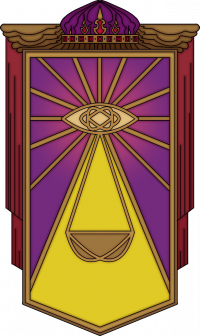 | |
| Religion | |
| Pronunciation | Union-ism |
| Origins | Emperor Theomar |
| Deities | |
| The Everwatcher and various other Gods and Goddesses | |
Unionism is the world's second largest religion only trailing shortly after Estelley, on account of the Ailor people being more religiously divided, though it is speculated that Unionism will become the largest religion within a century at least. Unionism at its core is a global unification movement which proclaims the benevolence of the divinely inspired Emperors of the Regalian Empire to bring order, stability, and law to the world that is filled with chaos and strife. Unionism is strongly tied to the Regalian State, and to some outsiders seen as an affirmation of state doctrine, but the Religion is actually quite inclusive, in that it tends to absorb tenets and Gods of other Religions to expand its inclusive message.
Origins
Unionism as a Religion was created in the year 5 AC when Emperor Theomar (the founding Regalian Emperor) proclaimed the Creed (the holy Scripture) as visions received from the Everwatcher. In the beginnings of the Empire, the faith was slow to spread, but through providence and divine intervention, as well as Regalia's military spread and aggressive missionary proselytizing, Unionism quickly spread from its small cult-like origins to a world-religion. It has over the years also absorbed Gods from smaller religions, and included Gods form other Religions to become a very all-inclusive cosmopolitan Religion. Unionism is a multi-ethnic religion that invites all peoples of Aloria to join under the Everwatcher.
Core Beliefs
Central Message
The central message of Unionism is that the Everwatcher created reality and that reality itself (which is often understood to be Dragons), filled it with creation (all living and non-living things). However, the Everwatcher demanded that creation be created flawed and sinful, so that it could be measured to its own potential before deserving paradise and the defeat of death. All living beings are born full of sin and must learn through the stories and preachings of the Gods to become sin-less, but also to contribute to the Great Way. When the Great Way is achieved, the Afterlife and the living world will become one, and all suffering and death will be cast aside to become forever paradise.
The Sins
Central to Unionism is the idea that every newborn is full of sin and that without guidance, that sin will overcome the soul and make a person rotten to the core. Only through divine guidance of the Gods, do the people learn what the sins are, and how to overcome them just as the Gods did with each other's guidance. These sins remain relevant in nearly all Unionist teachings, so this section will set out a more clear explanation of each of these terms.
- Indulgence: Indulgence occurs when a faithful is self-obsessed with pleasure seeking to the point of avoiding duty and responsibility. This includes an abundance of the carnal and material pleasures, gluttony, greed, etc.
- Belicosity: Bellicosity occurs when a faithful seeks no other recourse but to immediately stab a problem to death with violence. Bellicosity includes obsession with vengeance, wroth, and general ill-tempered violence.
- Mutiny: Mutiny occurs when a faithful seeks to upend the authority and order of the Regalian State, and breaks the social contract that the state provides, and the citizenry returns their loyalty to it in equal measure.
- Hatred: Hatred occurs when a faithful disdain something, a thought, or a person so deeply, that reason leaves them. Hatred is the logic-deprived and soul-damning emotion that makes all decisions ill-founded.
- Blightcraft: Blightcraft occurs when a faithful either makes a machine that causes suffering or re-purposes a benign device into a violent one. Exceptions are machines of war used to defend/expand the Empire/people.
- Iconoclasm: Iconoclasm occurs when a faithful engages in mindless cultural and civil destruction, the burning of books, the cutting of statues and paintings, and the destruction of cultural customs and traditions.
- Monomania: Monomania occurs when a faithful becomes so obsessed with a single task, person, or object, that all other pleasures and satisfaction in life withers, as do all social contacts and relationships.
- Defeatism: Defeatism occurs when loss and anguish overrule bravery and composure, resulting in lack of optimism, in refusing to engage with problems, and in refusing to face the reality that is.
- Maleficence: Maleficence occurs when a faithful uses Magic or other divine blessings for personal enrichment, instead of a duty to the Gods and the Empire through moral and dutiful employment in restraint.
- Hubris: Hubris occurs when a faithful's pride, ego, and vanity have reached such a point that they obsess over themselves and forget the contributions of others and venerability of those who have come before.
- Contempt: Contempt occurs when the faithful refuse to accept their fear towards an enemy, or acknowledge their merits and skills when when they are opposed, leading to their ultimate destruction.
The faithful should constantly seek to overcome these in-born sins, to seek temperance from life's delectable, to seek other means of victory and completion, to stay honest and loyal to the state and one another, to show reason and logic when faced with strong emotion, to seek the betterment of others, to preserve heritage and customs, to remain sober and loving to others, to remain optimistic and objective oriented, to bring honor to the gifts of the gods, to remain humble in the face of the giants of the past, and to acknowledge the betters of one's rivals and enemies. There is no expectation that any faithful is free of sin, and even to assume so is a form of Hubris. All faithful sin, even Gods, even priests, but everyone shares a collective responsibility to point out these sinners, and to put them on the pathway of virtue.
The Afterlife
The Unionism Afterlife is not yet truly reached. The Afterlife is currently called The Stairway, which refers to the idea that souls which have been allowed into The Afterlife, are in waiting, watching the still-living from a bird's eye view on the staircase that leads nowhere in the sky. The Everwatcher weighs the souls of the faithful as they perish, and if the Everwatcher finds too much sin, they are compelled back to the lower social classes, reincarnated to try again. If they have removed enough sin from their soul, the Everwatcher then measures if they have meaningfully contributed to the Great Way. If not, the Everwatcher compels them back to a higher social class in the Empire, giving them more opportunity to re-cleanse their soul of sin, and contribute to the great way. Only when one is as sinless as can be, and has contributed in some small or great means to the Great Way, does the Everwatcher permit a soul into The Afterlife, where they shall wait until the Regalian Empire spans the whole world and incorporates all living beings under one Emperor, after which Afterlife and living world are merged as one deathless and sorrowless reality.
The Great Way
The Great Way is the penultimate goal of Unionism and is one of the required stages for The Afterlife to truly transition into a Paradise. The Great Way is a more gentle way of saying World Domination of the Regalian Empire, believing that all landmasses and all nations and all people should be subject to the Regalian Empire, and obey the laws and words of the Regalian Emperor. Note, that this does not include Religious supremacy, the Regalian Empire allows other Religions to exist and flourish within it, so long as they do not contradict the central tenet of the Emperor's divine supremacy. The faith requires that the whole world be embraced with the Emperor's grace and love for them, and that through him, the Everwatcher can then initiate the completion of the Great Way as unity reaches all corners of the world. There is a great deal of debate about whether this is an oppressive thought. Some would say that violating the sovereignty of other nations is in itself a hostile act, but the Empire rarely expands through warfare, and mostly through diplomacy. The Empire is also no stranger to local autonomy and preservation of local laws and traditions, the only thing it utterly demands with no objection, is to obey the authority of the Emperor.
Gods and Goddesses
Unionist Gods and Goddesses are found within the central pantheon, and two additional cults. Within the pantheon, the Gods are divided into the three Divine Paramounts, and the 24 Divine Virtues. These Divine Virtues are divided into groups of two, each being referred to as a God-union, usually with a shared theme or message within the dogma. While the Divine Paramounts are free of sin or flaw, the Divine Virtues act as lessons to the faithful to guide their life and reach fulfillment for the Great Way. Beyond the central pantheon are the Guided and Evintarian Cults, these Cults have additional optional Gods, but they are not mandatory for the faith itself, only if a believer follows their core theological message. Note, some of the Gods found in the Pantheon are Joined Gods. This term describes a God who is initially part of another pantheon, but either due to conquest or integration, they either wholly join the Unionist pantheon, or have dual-membership between multiple religions, a form of polytheistic pluralism that proposes the Religion will keep expanding, as the Regalian Empire absorbs more cultures and Religions.
The Divine Paramount
- Theomar Theomar is the Prophet of Unionism, the first Vessel of the Everwatcher, and the first to speak and write the holy word of the faith in the Creed. Theomar does not represent any virtues, but he is still the most invoked God of Unionism, because he represents all the good virtues combined together. While all other Gods bar the Everwatcher have some kind of inherent flaw, Theomar is always considered the leader of the pantheon of Gods, and generally flawless.
- Everwatcher The Everwatcher is the enigmatic God being that spoke to Theomar about the gospel. No living or dead person has ever seen the Everwatcher, bar the Emperors of the Regalian Empire to whom it speaks divine will. The Everwatcher is said to be the source of all creation, even Dragons, but because it is such a mystifying being that only speaks through the Emperors, few can be said about it other than to invoke its name for good wishes or prayers.
- Alexander Alexander is the Vessel of Unionism, which is a rotating Godhood position held by the faith. When the previous Emperor dies, they lose their divinity, and it passes to the next Vessel as the new Emperor is crowned. Emperors can be flawed and sinners, but are made divine by the whispers of the Everwatcher which only they can hear in divine conclave. As such, Emperors of Regalia while alive are held to god-like status among the faithful.
The Divine Virtues
- Ness and Eora Ness (left) was the 4th Empress of Regalia Nessaria Calontir, and Eora (right) was the 4th Channcelor Eotranna I Kade. Ness was full of sinful indulgence, taking to the pleasures of life and absconding with duties of court and motherhood. Through the guidance of Eora, the both of them reached a higher state of virtue in duty and responsibility, living up to their roles in life, and being the mothers of the nation that gave all blessed forgiveness and nurture.
- Sinnavei and Vyrë Sinnavei (left) is the Goddess of honor and dignity, and Vyrë (right) is the Goddess of the unknown seas. Both were Estelley Gods incorporated when the Elven lands joined. Vyrë represents the sin of Bellicosity, with violence as a first answer, while Sinnavei showed her temperance and restraint as a more powerful tool to victory. Together they represent the virtue of caution and calmness, and receive offerings for safe passage on the seas and unknown lands.
- Glanzia and Juvin Glanzia (left) is a mundanely raised (still living) Goddess, and Juvin (right) was the 11th Emperor of Regalia Heinrich III Ivrae Heiligenblut. Both were full of sin in their own ways, Glanzia towards her enemies, Juvin towards facts contradicting his knowledge. Through each other, they learned purity, Glanzia to seek reason over hatred, and Juvin to seek knowledge expansion over dogma. Together they are the virtue of pure soul and pure thought and knowledge.
- Brand and Allest Brand (left) was the 17th Chancellor of Regalia, and Allest (right) was the 15th Emperor of Regalia Allestrain I Ivrae Heiligenblut. Allestrain was full of the sin of injustice, a soldier Emperor so beset with warfare and wroth, that he treated his subjects and nobles most foul. Through the guidance of Brand, Allest bettered his approach, and became a paragon of justice who saw to it that every injustice that reached him, would be answered by his sword.
- Tanthor and Dari Tanthor (right) and Dari (left) are both mundanely raised (still living) Gods who were once crime lord and city guard respectively. Tanthor lived a life of contempt for the state, spitting at any help offered. Dari however slowly showed him the value of loyalty to the state, of the wealth and fame even the most downtrodden can achieve by working with the hierarchy and order rather than being a child of chaos. Both became paragons of the social contract of the Empire.
- Marani and Al-Asir Marani (left) is mundanely raised and Al-Asir (right) is a Draconism God (both still living). Marani was full of the sin of blightcraft, the usage of technology to hurt and deceive, to use machines for foul deeds. Al-Asir showed him the virtue of technomoralism the idea that machines and inventions should serve progress and to better the lives of others, and that evil only comes from the use, not nature of technology. They represent altruism to the people.
- Neall and Nolven Neall (left) is a Fornoss God (Aedán), and Nolven is an enigmatic twin of Neall. Neall represents the sin of Iconoclasm, the irreverent destruction of cultural heritage, or purposeful burning of art to hurt society. Neall showed Nolven the virtue of preservation and respect for diversity, and together they now represent the varied juxtaposition of art and military. Nolven is also responsible for Unionist Godborn, who usually become holy warriors or paladins.
- Elia and Leona Elia (left) was the 15th Empress of Regalia, Leona (right) was the Knight-wife of the 15th Chancellor. Elia was the sin of Monomania, a singular obsessive behavior that sets aside all feelings and obligations to obsess over a single task or work. Elia obsessed over revenge for the death of her husband, and only the love of Leona could temper her obsession and show her how much she was losing her loved ones and purpose in life. Now they are the virtues of love and passion.
- Kaldric and Caan Kaldric (left) was a mundanely raised Calemberg crimelord, Caan is a (still-living) Aelrrigan Mage-Knight of mysterious origins. Kaldric was the sin of Maleficence, the usage of the divinely burdened gift of Magic for personal pleasure and enrichment. Magic to Unionism is a great moral burden, which Caan taught him, so that he could better put his fate to work serving the Great Way. Both now represent the Magic moralism and the correct way of using Magic.
- Celest and Eoin Celest (left) is a mundanely raised Nun, Eoin (right) is a mundanely raised Imperial Guard (both still living). Eoin was full of the sin of Hubris, to find such pride and vanity in his prestigious position in life, that he showed no regard for the actual weight of his obligation or venerability to elders and authority. Celest taught him the lessons of respect for those that came before, to honor his elders, and to serve their needs, and to respect the words of the sages.
- Belialus and Eirlys Belialus (left) was a Demon, Eirlys (right) was a pre-Empire Goddess of the Weard faith of the Breizh people who joined the Unionist pantheon. Belialus was a being of Contempt, showing no esteem or reverence to his enemies and suffering defeat as a result. Eirlys not only taught him humility and bravery in the face of one's enemies, she also reformed him and cleansed him of his sinful Demonhood, both representing the virtues of honesty and reform.
- Mendes and Hor Mendes (left) is a Baskarr God, Hor is a mundanely raised Asha (both still living). Mendes was full of the sin of Defeatism, the loss of his people, the suffering, it all became too much for him to bear. He gave in to despair and loss, and gave up on everyone. Hor taught him the virtue of action, and the value of time, how limited the means of mortals are to act, and the duties gods have to be diligent. They now represent the virtues of diligence and activeness.
Priestly Activities
Unionist priests are part of the so-called Covenant College. At the very top is the Secilly Council. Originally this organization had a leader called the Supreme Reverend, however the Supreme Reverend position was abolished when the last Supreme Reverend discovered insidious corruption within the religious community, tried to expose it, and was assassinated for it. To compensate, Conclave determined that the Dogmatic community should henceforth be ruled by a Council of elder Arch-Everians. Below the Secilly Council, are the Arch-Everian, which are equivalents to Dukes in the Regalian Empire. They wield considerable power and rule over vast areas of land, subdivided into Everies. Below the Arch-Everian is the Everian, or just the average priest. Each Everian administrates an Everie, which is usually a piece of land donated to the clergy where they maintain temples, shrines, and sanctuaries, while also producing crops and tending to cattle. Everians perform all religious tasks such as confession, preaching, hearing concerns, and simply taking care of Unionist needs like a social caretaker or mental health worker. Arch-Everians on the other hand are more administrative in that they take care of the treasury, any military attached to the religious orders, and communication between the Secilly Council and the vast wide-spread Unionist elements. Formally the Emperor is the leader of the Holy Seat, which is more of a group term for the Palace and the Secilly Council grouped, but historically Emperors have interfered very little in the day to day running of the Everies, and as such, this fact is usually ignored, the Emperor being considered a completely independent entity. This has also historically separated the Emperor from controversy among the Everians, and vice versa.
Expanded Lore
The Expanded Lore section contains additional contextual information about the Unionist faith. This section is not necessary to read to get a good understanding of the lore, just the background information.
Contextual Lore
This section contains a group of assorted ideas and pieces of information that are not at first glance relevant to the Religion or its texts, but that may become relevant when engaging in theological debate, or deeper storytelling about the Gods, as priests habitually do. This information is freely available to the people through reading archives and history books, though some of it may be a bit more contextual. If something would not be clear from history books, but learned by researching other religions and or belief systems, this will be mentioned.
- Gods are either mundanely raised, incorporated, or post-death ordained. In the case of mundane raising, it is believed that the Everwatcher chooses a Unionist born child and gives them a divine spark, testing them in life for Godhood. If they pass, they become Gods and activate their Godly powers, and should they fail, they lose their Godhood. Incorporated Gods are always Gods from other Religions bringing religious aspects from their original faith into Unionism though this can never count as Syncretism because the dogma is always slightly different. Finally, post-death ordainment occurs usually with Emperors and Empresses, who due to their closeness to the Vessel have a more likely chance of becoming Gods after death if they were legendary in life.
- There are some speculative theories that the Chancellors and Emperors were actually Dragonsouls, that is to say, they inherited their souls from Dragons and were physically Dragons just often not aware. This doesn't strictly change theological theories, because Dragonsouls are persistent and undying, constantly reincarnating, while their divine persona diverges. In essence, while Nicholas's Dragonsoul would have been passed to his great-grandchild Morgenkroon Kade, his Unionist divine persona diverged and became a stand-alone divine entity known as the God Nicholas. The bottom line is that there is no secret Dragon plot within Unionism, and even if there was, the Dragons have been reincarnated so far away from their original intention that Unionism is no longer recognizable from whatever plot it might have originated.
- Some Gods have intense relationships that are relevant to their stories. Ness and Eora lived in the same era as mortals, and were friends. Brand and Allest lived in the same era, and were lovers, even though Allest was married to Elia and Brand to Leona. Marani and Al-Asir are rumored to be lovers, but are cagey about the subject and show no public evidence of this. Neall and Nolven are supposedly twins, but there is no evidence of Aedán having a twin in the Fornoss faith so theory has it that they may be split personalities. Elia and Leona lived in the same era, and were lovers, even though Elia was married to Allest and Leona to Brand.
- Eirlys and Sinnavei date from around the same period, and have often been treated as friend-Goddesses, both having joined Unionism at the same time, and carrying their people with them. Though, Sinnavei still also holds a role within the Estelley Religion, and also has an Evolist God as a lover called Morrlond which raises some complications.
- Mendes was once an Asha God of the Dewamenet Empire, but became disillusioned with millennia of hiding during the Pearl Wars. While most Asha Gods stayed true to the faith of Baskarr, Mendes did not and essentially abandoned the Asha in despair. The Gods of the Dewamenet faith, and Hor, are still in their ongoing attempts to fold Mendes back into Baskarr, though he has indicates that he will not do so until the faith stabilizes from its current half-broken state.
Unionism and Magic
Magic has an extremely complicated place in Unionism. Unionism acknowledges God Magic (universally good), and Void/Exist Magic (mostly bad) but does not acknowledge Ordial Magic as real. Extraplanar Magic (not mechanically granted by the Unionist Gods) however, still exists with the permission of the Everwatcher and the allowance of these things to become material and tangible in Aloria, which is his created reality. As a result, priests have argued that through a roundabout way, the Everwatcher is also responsible for the Exist and Void, and thus all forms of Magic, even if Unionist God Magic is more pure. The dogma in essence has taken the stance that God Magic is often granted as a reward for service, while Extraplanar Magic is granted at birth as an additional Sin (hence, the Gods Kaldric and Caan). Extraplanar Magic carries the burden of additional duty and mental strain for the faithful, who must maneuver life to understand when and how to ply their Magic for good instead of self indulgence and evil. Magic is not by nature evil, but the dogma implies that more likely than not, do Mages fail to overcome their inherent sin, and become a type of super-sinner. This has led to periods of extreme magical repression and general mistrust towards Mages, purely because of the incidence rate at which Mages end up going in the opposite direction of what Unionism demands of them.
History of the Schisms
Not yet complete
Minor Cults
Not yet complete
Additional God Info
Not yet complete
Trivia
- Unionism used to be mandatory for nobility somewhere during the second century after Cataclysm, though this Holy Law was removed when the war against the Skagger Horde ceased, and the Empire benefited more from including non-Unionists into the peerage. An exception had always been made for the Solvaan nobles in Solleria however, called the Confessions of Melennar.
- Sectarian violence largely came to an end at the turn into the fourth century as the last attacks on Vultragon Unionist by state forces ceased, and an uneasy truce was signed between the Schism religious communities. They still do not see eye-to-eye, and the different Schismatic groups still prod at each other, but instead of murdering each other over sectarian differences, they mostly fight with words nowadays, a legacy of the Kleine Rechnung, the document that called for the truce.
- Despite Eirlys's absorption into Unionism, the Breizh still maintained a high level of cultural autonomy, some even clinging to old beliefs. As such, even when Magic became illegal in the Empire, the Breizh Aelrrigan Order continued to find and train Mages safely in their sanctuaries while the rest of the Empire turned to brutal oppression (and the Magic part of Eirlys was suppressed from dogma). Eirlys' faithful among the Aelrrigan Order are commonly cited as the reason why Magic acceptance eventually returned, and Eirlys' magical nature in theological teachings was returned.
| ||||||||||
| Accreditation | |||||||
|---|---|---|---|---|---|---|---|
|
| ||||||
